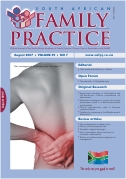A comparison of clinical communication skills between two groups of final year medical students with different levels of communication skills training
Keywords:
Communication skills training, medical education
Abstract
Background Training in communication skills is prominent in many undergraduate medical programmes. In South Africa, training in this highly complex skill is developing rapidly, especially against the backdrop of a multilingual and multicultural society. Little work has been done locally to evaluate which training works best in our context. In 1999, the Stellenbosch University Faculty of Health Sciences introduced a new curriculum that included considerably more communication skills training. The aim of this study was to assess and compare the communication skills used in the consultations of two groups of final-year medical students who had different levels of communication skills training in order to make recommendations on appropriate changes in this training. Methods Standardised doctor-patient interviews performed by students during the final-year examinations in 2003 and 2004 were videotaped. These were assessed by two independent, blinded evaluators using an abbreviated version of the Calgary-Cambridge communication guide for skills not done (0) and done (1). The data was analysed using STATISTICA 7. Results A total of 161 interviews were analysed. Both groups performed well (mean = 1) in listening to the opening question, encouraging the patients to tell their story, and demonstrating appropriate non-verbal behaviour. However, ending the session by summarising and clarifying the plan was poorly performed (mean = 0.4). The 2004 group was statistically significantly better in structuring the consultation by using signposting (p value = 0.02). Conclusion There are a number of influences on the effectiveness of communication skills training, including issues around language, culture and gender, student attitudes, the significance of communication skills training in the programme and, most importantly, the integration of this training into the curriculum as a whole. Merely adding more time to communication skills training does not seem to be the answer. Incorporating a wider range of training methods is also important. The results of this impact study acted as an impetus for innovative curriculum development in our faculty, leading to the development of a comprehensive clinical model and a “golden thread"? for communication skills in the curriculum to ensure the longitudinal integration of communication skills.
Published
2007-08-02
Section
Original Research
By submitting manuscripts to SAFP, authors of original articles are assigning copyright to the South African Academy of Family Physicians. Copyright of review articles are assigned to the Publisher, Medpharm Publications (Pty) Ltd, unless otherwise specified. Authors may use their own work after publication without written permission, provided they acknowledge the original source. Individuals and academic institutions may freely copy and distribute articles published in SAFP for educational and research purposes without obtaining permission.

